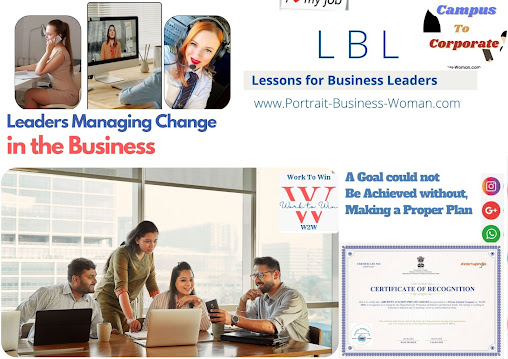Leaders Managing Change in the Business
by Darshana Khandelwal
#Setting the Business Goals#Creating the Plans
#Understand the Change Process
#Focus on Developing Skills
Managing change within the organization refers to setting the Goals clearly and working closely with the Team members. If changes have been done correctly it will assist the Business Leader to gain loyalty and respect from the employees at the workplace.
Nobody could stop a Leader from winning, he should do proper planning and participate in various activities to win while working in the organization. Certain ways by which the Leader can manage the change effectively and efficiently in the organization.
#Setting the Business Goals
Every Leader works in the organization to win and become successful thereby achieving the Goals but it is only possible with the support and teamwork of all the members in the Team at the workplace. Goals should be clearly defined by the Leader as it will assist in organizing your resources and time within the organization.
A Goal could not
Be Achieved without,
Making a Proper Plan
#Creating the Plans
The plan should be made in such a way that it should clearly state the reasons for making the change, defining the scope, preparing detailed roadmap and establishing the Team and taking effective decisions. A Leader could win in his work if he will plan and strategize the clear Objectives in a creative and innovative manner and that too it must be understood by all the employees.
#Understand the Change Process
One of the best ways to understand the process of change is to follow the various stages that involve preparation, implementation and follow up. The preparation stage is all about preparing both the employees and the organization in understanding their needs, the implementation stage is about executing the changes and the last stage is adapting to all the changes.
Adapting to Change
Will lead to Progress,
And Success
#Focus on Developing Skills
A Business Leader must focus on developing the skills of the employees at the workplace. Once the employees have developed skills such as managing stress, managing time and good communication it will become convenient to adapt and manage the changes taking place in the organization. Skill development plays a very crucial role in managing dynamic change in the organization.
Darshana Khandelwal
darshanakhandelwal05@gmail.com
www.linkedin.com/in/darshana-khandelwal-0440861aa
https://docs.google.com/document/d/1wOWfmbIW_MLO4PXs6MSjAy1epMbDixoD8bq-uiG27_U/edit?usp=sharing
https://www.portrait-business-woman.com/2022/02/darhana-khandelwal.html
Leaders Managing Change in the Business
by Darshana Khandelwal https://bit.ly/3pNq0l9
#Goal #Leader #Team #Business #Objectives





































